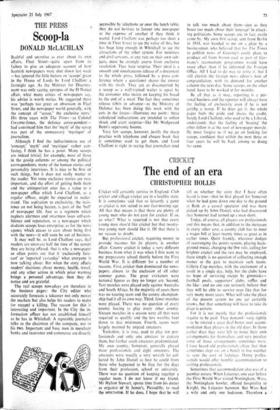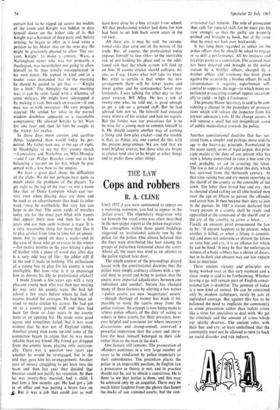The end of an era
CRICKET CHRISTOPHER HOLLIS
Cricket will certainly survive in England. Club cricket and village cricket are in a healthy state. It is sometimes said that so leisurely a game as cricket is not suited to our fast-moving age. All that that means is that there are plenty of young men who do not care for cricket. If so, so what? What is required is not that every young man shou'd like cricket but that twenty- two young men should like it. Of that there is no reason to doubt.
But professional cricket, requiring money to provide incomes for its players, is another affair. County cricket is today a very different business from what it was when I first went to my preparatory school shortly before the First World War. It is different for a number of reasons. First, cricket then dominated the news- papers almost to the exclusion of all other summer games. The great cricketers were national figures as they no longer are. Second, Test matches were played only against Australia and South Africa. In the majority of years there was no touring team and the county champion- ship had it all its own way. Third, fewer matches were played. There was no question of every county having to play every other county. Sixteen matches in a season were all that were required to qualify and the less wealthy kept down to that minimum. Fourth, teams were largely manned by unpaid amateurs.
Yorkshire, it is true, used to play ten pro- fessionals and only one amateur to captain them, but farther south amateurs predominated. My own county, Somerset, generally played three professionals and eight amateurs. The amateurs were usually a very scratch- lot col- lected by John Daniel as best he could from those who happened to be free for the days from their profession, school or university. There was no question of keeping together a regular team. I do not know if my friend, Mr Hylton Stewart, spares time from his duties as Organist' of St James's, Piccadilly; to read the SPECTATOR. If he does, I hope that-he will tell us whether the story that I have often heard is true—that he first played for Somerset when he had gone down one day to the ground at Bath as a casual spectator and was there picked up by John Daniel, who had discovered that Somerset had turned up a man short.
Today, of course, all players are professionals and this means that, in addition to the increases in every other cost, a county club has to meet a wages bill at least twenty times as great as in earlier times. Quite frankly, whatever dodges of rearranging the points system, playing back- ground music, changing the lbw rule, calling for brighter cricket and the rest may be employed, there simply is no question of collecting enough money at the gate to maintain such teams. Gillette Cup matches, with the excitement of a result in a single day, help, but the clubs have no hope of surviving except by gimmicks— football pools, supporters' clubs, raffles and the like—and no one can seriously believe that they will be able to survive even like that for very many more years. What will take the place of the present system no one yet certainly knouts; but that something will have to take its place is certain.
For it is not merely that the professionals require to be paid. They demand—very rightly • —to be treated a great deal better over accom- modation than players in the o1d days. In those earlier days they were left to make their own arrangements for themselves, and very peculiar some of those arrangements sometimes were. I have heard old professionals-allege that they sometimes slept out on a bench in fine weather to save the cost of lodgings. Home profes- sionals would offer humble accommodation to visiting professionals.
Sometimes that accommodation also was of a peculiar nature. When Leicester, one year before • the First World War visited Nottingham, Wass, the Nottingham bowler, offered hospitality to Knight, the Leicester batsman. But Wass had ' a wife and only one bedroom. Therefore a-
curtain had to be rigged up across the middle of the room and Knight was bidden to doss himself down on the hither side of it. But Knight was a batsman of deep piety and, before retiring, he began to offer in a loud voice a petition to his Maker that on the next day He might be graciously pleased to allow 'Thy ser- vant, Knight.' to make a century. Wass, a Nottingham miner who was not primarily a theologian, was nevertheless not going to allow himself to be thus tamely outsupplicated in his own house. He replied in kind and in a louder voice demanded that in the morning he should be guided to 'get that — Knight for a blob.' The Almighty the next morning was, it can be seen, faced with a dilemma of some delicacy. He might have sidestepped it by making it rain, but such an evasion—if one may say so with reverence—He very properly rejected. He settled for what in the eternal wisdom doubtless appeared as a reasonable compromise. He allowed Knight to hit Wass for one four and then let him be caught at the wicket for twelve.
In those days more curious and carefree things happened than would today be per- mitted. My father took me, at the age of eight, to Headingley to see my first county match —Lancashire and Yorkshire on Whit-Monday —and I saw Walter Brearley come out to bat balancing a tea-pot on his bat, which he pre- sented with a low bow to the umpire.
We hear a great deal about the difficulties of the clubs. We do not perhaps hear quite as much about the problems of the players. To get right to the top of the tree—to win a name like that of Denis Compton which can sur- vive even when playing days are done and be used as an advertisement that leads to other work—may be worthwhile. But very few can hope to do that. The score cards of matches today are for the most part filled with names that appear there now and then for a few years and are then sunk without a trace. It is a very reasonable thing for those that like it to play cricket from time to time for an amuse- ment, but to spend six days a week—and in the case of those who go overseas in the winter —for twelve months in the year hitting a piece of leather with a piece of wood day after day is a very odd way of life: the odder still if in the end it leads to nothing. The enthusiasm of a young boy to play for his county is very intelligible. But how wise is it to encourage him to devote his life to professional cricket?
I made friends a few years ago with a very pleasant young man who was then just making his way into his county team. He had left school a few years before where he had, of course, headed the averages. He had been ad- vised to make cricket his career. He had got on to a county ground staff and then had been for three or four years in the county team as an opening bat. He made some good scores and sometimes failed, but it was soon evident that be was not of England timber. Another young man came up and some of the committee began to argue that he was more reliable than my friend. My friend got dropped from the county team, playing only occasion- ally. There was a question two years ago whether he would be re-engaged, but in the end they gave him his re-engagement. Another year of misery struggling to get back into the team and then last year they decided tlielt
finances could not justify his retention. By then he was twenty-five, married, had a child. I met him a few months ago. He had got a job
in an office and was putting a brave face on A But it was a job that could just as well
have been done by a boy straight from school. All that professional cricket had done for him had been to set him back seven years in the rat race.
All these are, it may be said, the occupa- tional risks that arise out of the nature of the trade. But, of course, the professional today exposes himself to two risks—to the inevitable risk of not holding his place and to the addi- tional risk that the whole system will fold up on him. If county cricket should collapse, no. one, as I say, knows what will take its place. But what is certain is that under the new arrangement there will be fewer teams and fewer games and by consequence fewer pro- fessionals. I was talking the other day to that great veteran, Bill Alley. He has a son of twenty-one who, he told me, is good enough to get a job on a ground staff. But he had advised him not to. He himself had enjoyed every minute of his cricket and had no regrets. But the future was too precarious for it to be wise for a young man to commit himself to it. He should acquire another way of earning a living and then play cricket—and the trouble is that, as things are, one cannot do this with the present programmes. We are told that we want brighter cricket, but those who are bright at cricket tend also to be bright at other things and to prefer those other things.































 Previous page
Previous page